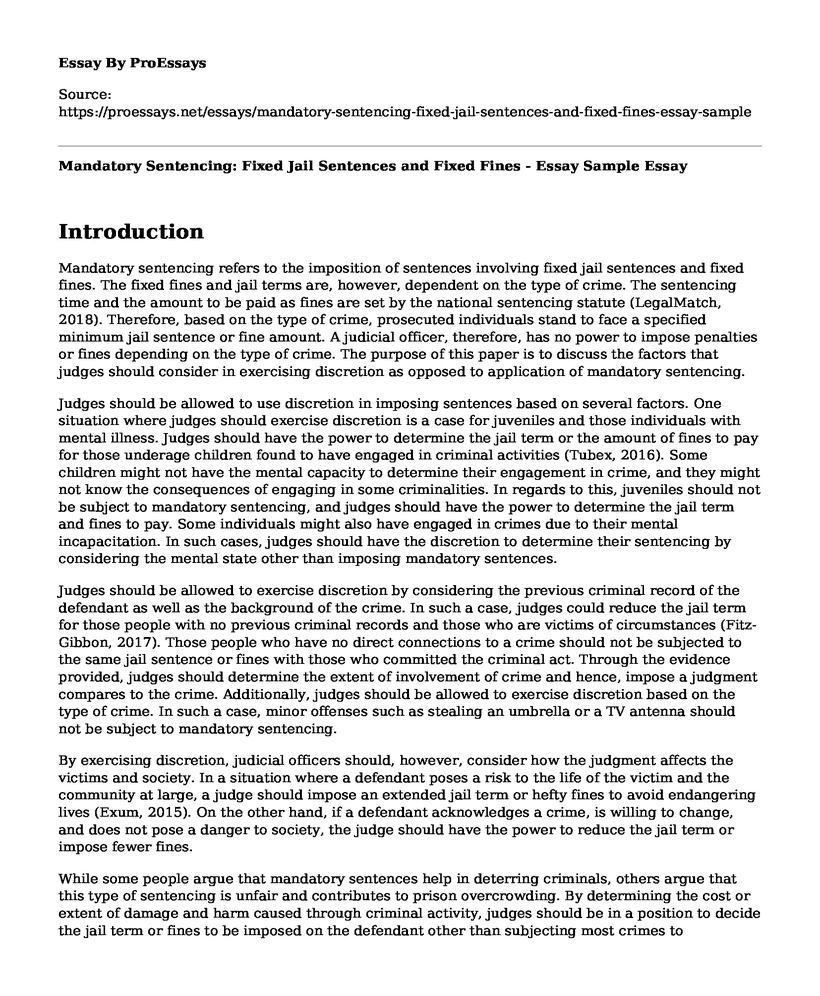Introduction
Mandatory sentencing refers to the imposition of sentences involving fixed jail sentences and fixed fines. The fixed fines and jail terms are, however, dependent on the type of crime. The sentencing time and the amount to be paid as fines are set by the national sentencing statute (LegalMatch, 2018). Therefore, based on the type of crime, prosecuted individuals stand to face a specified minimum jail sentence or fine amount. A judicial officer, therefore, has no power to impose penalties or fines depending on the type of crime. The purpose of this paper is to discuss the factors that judges should consider in exercising discretion as opposed to application of mandatory sentencing.
Judges should be allowed to use discretion in imposing sentences based on several factors. One situation where judges should exercise discretion is a case for juveniles and those individuals with mental illness. Judges should have the power to determine the jail term or the amount of fines to pay for those underage children found to have engaged in criminal activities (Tubex, 2016). Some children might not have the mental capacity to determine their engagement in crime, and they might not know the consequences of engaging in some criminalities. In regards to this, juveniles should not be subject to mandatory sentencing, and judges should have the power to determine the jail term and fines to pay. Some individuals might also have engaged in crimes due to their mental incapacitation. In such cases, judges should have the discretion to determine their sentencing by considering the mental state other than imposing mandatory sentences.
Judges should be allowed to exercise discretion by considering the previous criminal record of the defendant as well as the background of the crime. In such a case, judges could reduce the jail term for those people with no previous criminal records and those who are victims of circumstances (Fitz-Gibbon, 2017). Those people who have no direct connections to a crime should not be subjected to the same jail sentence or fines with those who committed the criminal act. Through the evidence provided, judges should determine the extent of involvement of crime and hence, impose a judgment compares to the crime. Additionally, judges should be allowed to exercise discretion based on the type of crime. In such a case, minor offenses such as stealing an umbrella or a TV antenna should not be subject to mandatory sentencing.
By exercising discretion, judicial officers should, however, consider how the judgment affects the victims and society. In a situation where a defendant poses a risk to the life of the victim and the community at large, a judge should impose an extended jail term or hefty fines to avoid endangering lives (Exum, 2015). On the other hand, if a defendant acknowledges a crime, is willing to change, and does not pose a danger to society, the judge should have the power to reduce the jail term or impose fewer fines.
While some people argue that mandatory sentences help in deterring criminals, others argue that this type of sentencing is unfair and contributes to prison overcrowding. By determining the cost or extent of damage and harm caused through criminal activity, judges should be in a position to decide the jail term or fines to be imposed on the defendant other than subjecting most crimes to mandatory sentencing.
References
Exum, J. J. (2015). A Commentary on Judicial Discretion, Mandatory Minimums, and Sentencing Reform. Fed. Sent'g Rep., 28, 209.
Fitz-Gibbon, K. (2017, April 18). Mandatory minimum sentences and populist criminal justice policy do not work? Here's why. Retrieved from https://theconversation.com/mandatory-minimum-sentences-and-populist-criminal-justice-policy-do-not-work-heres-why-76142
LegalMatch. (2018, June 25). What Is Mandatory Minimum Sentencing? Retrieved from https://www.legalmatch.com/law-library/article/what-is-mandatory-minimum-sentencing.html
Tubex, H. (2016, January 4). Mandatory sentencing leads to unjust, unfair outcomes? It doesn't make us safe. Retrieved from https://theconversation.com/mandatory-sentencing-leads-to-unjust-unfair-outcomes-it-doesnt-make-us-safe-52086
Cite this page
Mandatory Sentencing: Fixed Jail Sentences and Fixed Fines - Essay Sample. (2023, Mar 13). Retrieved from https://proessays.net/essays/mandatory-sentencing-fixed-jail-sentences-and-fixed-fines-essay-sample
If you are the original author of this essay and no longer wish to have it published on the ProEssays website, please click below to request its removal:
- Examining the Relationship between Veterans, Substance Use, and Crime: Research Proposal
- Article Analysis Essay on "Acting out Culture"
- Research Paper on Organized Crime
- Diversion Programs Essay Example
- LGBT Human Rights Defenders Criminalized in Caribbean Nations: IACHR - Essay Sample
- Essay Example on Marijuana Use: Debates, Research and Results
- Truth & Reconciliation Commissions: Examining Past Human Rights Abuses & Historical Injustices - Essay Sample







